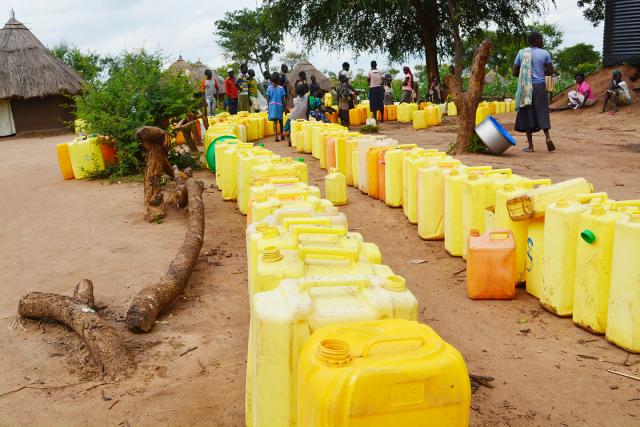Refugee Crisis: Uganda at breaking point, support needed-OPM

While many countries would close their doors to refugees, Uganda would welcome them with wide open arms. “Uganda is committed to maintaining an open door policy to refugees fleeing from conflict in their home countries if resources to support their stay are available,” said Charles Bafaki, the Principal Settlement Officer in the Office of the Prime Minister (OPM) during a media briefing on Uganda’s refugee crisis hosted by the Lutheran World Federation (LWF), OPM and UNHCR at Imperial Royale hotel in Kampala.
Speaking on behalf of OPM, Bafaki noted that despite the continuous refugee influx to Uganda and constraints faced by Her government, Uganda will not turn Her back on them (refugees).
In a statement issued to the media, Jesse Kamstra, LWF’s Country Representative echoed Bafaki’s statement “Uganda made commitments during the Universal Periodic Review process towards the refugee crisis, we need to jointly work towards achieving them. “This responsibility is not just for the Republic of Uganda; it is a joint burden that we all need to own up”
Kamstra explained that an open door policy to refugees without providing their basic needs as well as training, skills and business start-up kits for sustainable development and self-reliance is not enough. “To achieve reliance in the refugee community, we need to prioritise quality education for refugees” the statement read in part.
Education for all is needed
Windle Trust’s Emmanuel Curuma explained that through education, Uganda can create a resourceful generation of refugees with viable skills through which they can earn a living. “Through education, we are not only making them knowledgeable but we pass on skills they can use to earn a living in future,” “We are preparing a generation that will manage and develop South Sudan when it regains peace,” Curuma added.
He however raised his dismay saying that only 8% of secondary school going refugee children aged between 14 -17 years have access to secondary education and only 1% of those between 18-36 years have access to tertiary education. Curuma blamed the low rates to limited funding saying that the demand for education higher than the available resources.
“We don’t have access to secondary and university education which makes worry about our future” echoed Yanick Ndamu, a Congolese refugee from Rwamwanja settlement.
Other than education, healthcare, protection and access to water remain some of the major demands of refugees that are still lacking.

A sustainable solution to water supply is needed
UNHCR’s Jane Maonga raised her concern about refugees not accessing the global water standard sphere of 15 litres. Maonga who is UNHCR’s water, sanitation and hygiene coordinator said that Uganda’s refugee settlements need a daily water supply of 20 million litres which can hardly be attained due to limited resources.
She explained that water supply in settlements is largely dependent on water trucking, which is an expensive and unsustainable alternative.
Maonga emphasised that sustainable solutions for adequate water supply in Uganda’s refugee settlements are needed as access to water is a fundamental right to everybody. She however added that sustainable solutions call for funds which are currently inadequate.
Protection
Even away from war stricken home-South Sudan, refugees still face protection issues in Uganda’s settlements. The government through OPM with support from humanitarian organizations like LWF provide protection to them (refugees).
Sexual gender based violence (SGBV) and tribal conflicts remain some of the major protections threats in Uganda’s settlements. “Gender Based Violence cases are prevalent in settlements as violence against women is still endemic and they face heightened risks of GBV, including sexual assault, early as well as forced marriage and exploitation,” echoed Betty Lamunu, LWF’s Protection Advisor.
An SGBV survivor, Emmanuella Achan (not her real name), a South Sudanese refugee based in Adjumani testified about how she was continuously sexually abused by her husband at the media brief.
In an emotional testimony Achan said as a result of continuous forceful sexual acts by her husband, she suffered from emotional and physical complications. “Life became meaningless for me and I thought of committing suicide…I lived in a state of hopelessness,” Achan said.
Lamunu explained that such pervasive violence tremendously affects individual women, their families, and communities. Achan continued to say that with psychosocial counselling from LWF, her emotional complications are becoming history. “The counselling is restoring my humanity and self-dignity,” lauded Achan.

